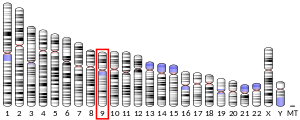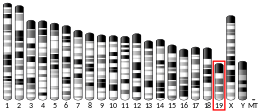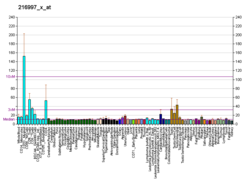TLE4
Transducin-like enhancer protein 4 is a protein that in humans is encoded by the TLE4 gene.[5][6]
Interactions[edit]
TLE4 has been shown to interact with PAX5.[7][8]
References[edit]
- ^ a b c GRCh38: Ensembl release 89: ENSG00000106829 - Ensembl, May 2017
- ^ a b c GRCm38: Ensembl release 89: ENSMUSG00000024642 - Ensembl, May 2017
- ^ "Human PubMed Reference:". National Center for Biotechnology Information, U.S. National Library of Medicine.
- ^ "Mouse PubMed Reference:". National Center for Biotechnology Information, U.S. National Library of Medicine.
- ^ Miyasaka H, Choudhury BK, Hou EW, Li SS (August 1993). "Molecular cloning and expression of mouse and human cDNA encoding AES and ESG proteins with strong similarity to Drosophila enhancer of split groucho protein". European Journal of Biochemistry. 216 (1): 343–52. doi:10.1111/j.1432-1033.1993.tb18151.x. PMID 8365415.
- ^ "Entrez Gene: TLE4 transducin-like enhancer of split 4 (E(sp1) homolog, Drosophila)".
- ^ Eberhard D, Jiménez G, Heavey B, Busslinger M (May 2000). "Transcriptional repression by Pax5 (BSAP) through interaction with corepressors of the Groucho family". The EMBO Journal. 19 (10): 2292–303. doi:10.1093/emboj/19.10.2292. PMC 384353. PMID 10811620.
- ^ Milili M, Gauthier L, Veran J, Mattei MG, Schiff C (August 2002). "A new Groucho TLE4 protein may regulate the repressive activity of Pax5 in human B lymphocytes". Immunology. 106 (4): 447–55. doi:10.1046/j.1365-2567.2002.01456.x. PMC 1782747. PMID 12153506.
Further reading[edit]
- Stifani S, Blaumueller CM, Redhead NJ, Hill RE, Artavanis-Tsakonas S (October 1992). "Human homologs of a Drosophila Enhancer of split gene product define a novel family of nuclear proteins". Nature Genetics. 2 (2): 119–27. doi:10.1038/ng1092-119. PMID 1303260. S2CID 32142845.
- Nagase T, Ishikawa K, Kikuno R, Hirosawa M, Nomura N, Ohara O (October 1999). "Prediction of the coding sequences of unidentified human genes. XV. The complete sequences of 100 new cDNA clones from brain which code for large proteins in vitro". DNA Research. 6 (5): 337–45. doi:10.1093/dnares/6.5.337. PMID 10574462.
- Eberhard D, Jiménez G, Heavey B, Busslinger M (May 2000). "Transcriptional repression by Pax5 (BSAP) through interaction with corepressors of the Groucho family". The EMBO Journal. 19 (10): 2292–303. doi:10.1093/emboj/19.10.2292. PMC 384353. PMID 10811620.
- Milili M, Gauthier L, Veran J, Mattei MG, Schiff C (August 2002). "A new Groucho TLE4 protein may regulate the repressive activity of Pax5 in human B lymphocytes". Immunology. 106 (4): 447–55. doi:10.1046/j.1365-2567.2002.01456.x. PMC 1782747. PMID 12153506.
- Beausoleil SA, Jedrychowski M, Schwartz D, Elias JE, Villén J, Li J, Cohn MA, Cantley LC, Gygi SP (August 2004). "Large-scale characterization of HeLa cell nuclear phosphoproteins". Proceedings of the National Academy of Sciences of the United States of America. 101 (33): 12130–5. Bibcode:2004PNAS..10112130B. doi:10.1073/pnas.0404720101. PMC 514446. PMID 15302935.
- Heimbucher T, Murko C, Bajoghli B, Aghaallaei N, Huber A, Stebegg R, Eberhard D, Fink M, Simeone A, Czerny T (January 2007). "Gbx2 and Otx2 interact with the WD40 domain of Groucho/Tle corepressors". Molecular and Cellular Biology. 27 (1): 340–51. doi:10.1128/MCB.00811-06. PMC 1800652. PMID 17060451.










